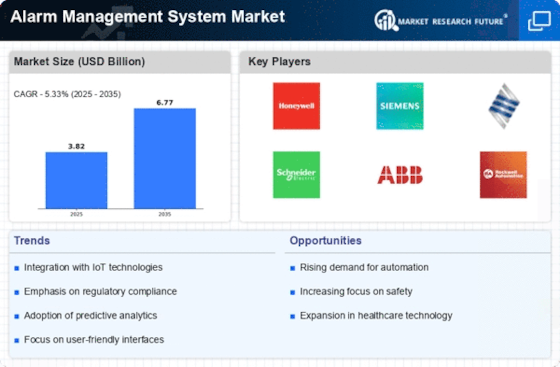Expansion of Smart Infrastructure
The Alarm Management System Market is benefiting from the expansion of smart infrastructure initiatives across various sectors. As cities and organizations invest in smart technologies, the integration of advanced alarm management systems becomes essential to ensure safety and security. Smart buildings and facilities require sophisticated alarm systems that can communicate with other technologies, providing a cohesive approach to safety management. This trend is particularly evident in urban development projects, where the demand for integrated alarm solutions is on the rise. Market analysts project that the adoption of smart infrastructure will drive a significant increase in the alarm management market, with estimates suggesting a growth rate of approximately 18% over the next five years. This reflects a broader movement towards interconnected systems that enhance overall safety.
Increased Regulatory Requirements
The Alarm Management System Market is shaped by stringent regulatory requirements that mandate the implementation of effective alarm management practices. Various sectors, particularly healthcare and industrial operations, are subject to regulations that necessitate the establishment of comprehensive alarm systems to ensure safety and compliance. For instance, the Joint Commission in healthcare has set forth standards that require hospitals to manage alarms effectively to prevent alarm fatigue among staff. This regulatory landscape compels organizations to invest in advanced alarm management systems, thereby driving market growth. As compliance becomes increasingly critical, the market is likely to expand, with projections indicating a potential increase in demand for alarm management solutions by approximately 20% over the next few years.
Growing Awareness of Alarm Fatigue
The Alarm Management System Market is increasingly addressing the issue of alarm fatigue, which has emerged as a significant concern in environments such as hospitals and industrial facilities. Alarm fatigue occurs when personnel become desensitized to alarms due to their frequency, leading to potential oversights in critical situations. This awareness has prompted organizations to seek more effective alarm management solutions that prioritize alarm optimization and prioritization. As a result, the market is witnessing a shift towards systems that not only generate alerts but also provide actionable insights to enhance decision-making. This trend is expected to contribute to a market growth rate of around 12% in the next few years, as organizations strive to improve safety and operational efficiency.
Rising Demand for Safety and Security
The Alarm Management System Market experiences a notable surge in demand driven by an increasing emphasis on safety and security across various sectors. Organizations are prioritizing the protection of assets, personnel, and sensitive information, leading to heightened investments in alarm management systems. According to recent data, the market is projected to grow at a compound annual growth rate of approximately 10% over the next five years. This growth is indicative of a broader trend where businesses recognize the necessity of robust alarm systems to mitigate risks and enhance operational efficiency. As industries such as healthcare, manufacturing, and energy continue to expand, the need for effective alarm management solutions becomes increasingly critical, thereby propelling the market forward.
Technological Advancements in Alarm Systems
The Alarm Management System Market is significantly influenced by rapid technological advancements that enhance the functionality and efficiency of alarm systems. Innovations such as artificial intelligence, machine learning, and the Internet of Things (IoT) are being integrated into alarm management solutions, allowing for real-time monitoring and predictive analytics. These advancements not only improve response times but also reduce false alarms, which have been a persistent challenge in the industry. As organizations seek to leverage these technologies, the market is expected to witness substantial growth, with estimates suggesting an increase in market size by over 15% in the coming years. This trend underscores the importance of staying abreast of technological developments to maintain competitive advantage.


















